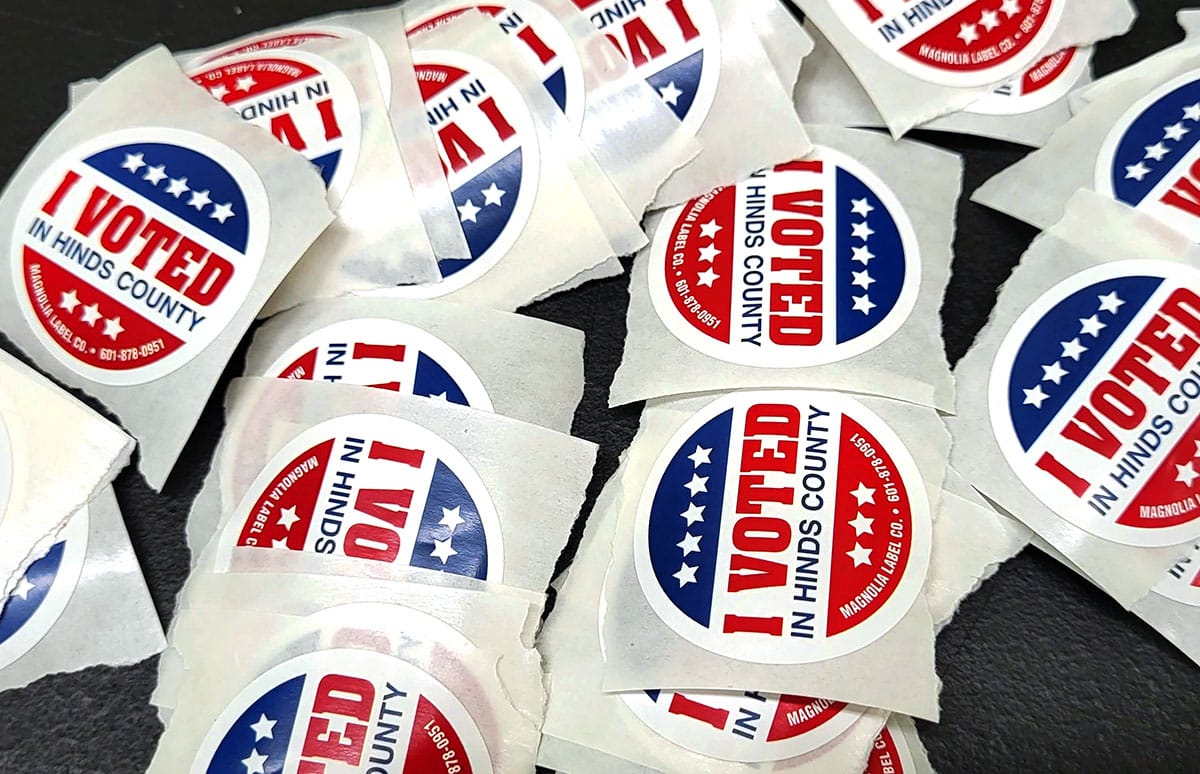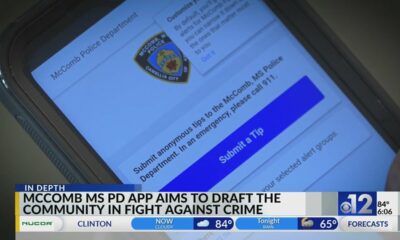Mississippi Today
Speaker White asks GOP leaders to explore restoration of voting rights to some people convicted of felonies

Top leaders in the Mississippi House are in the early stages of crafting a pathway for some people convicted of disenfranchising felonies to have their voting rights restored — the first such effort at the Capitol in more than a decade.
Speaker Jason White, a Republican from West, told Mississippi Today that he has tasked Constitution Committee Chairman Price Wallace and Judiciary B Committee Chairman Kevin Horan with proposing legislation that would restore suffrage for Mississippians convicted of certain felonies.
“I've talked to some members in the House, and I haven't gotten any negative response,” said Wallace, a Republican from Mendenhall.
The two committee leaders at this stage have different ideas about which types of disqualifying felonies shouldn't be subject to the lifetime voting ban. But both agree that suffrage should be restored only after someone has completed the terms of their sentence.
Wallace said he was open to restoring suffrage for people convicted of nearly all nonviolent crimes. Horan, a Republican from Grenada, said he also wants to explore restoring suffrage to people convicted of some lower-level violent crimes, with the exception of people convicted of embezzling public money.
“I don't see why we wouldn't at least look into it,” Horan said. “But I haven't really thought that much about it at this stage.”
Under the Mississippi Constitution, people convicted of any of 10 felonies — including perjury, arson and bigamy — lose their voting rights for life. A 2009 opinion from the Mississippi Attorney General's Office expanded the list of disenfranchising felonies to 22.
About 37,900 names are on the Secretary of State's voter disenfranchisement list as of Jan. 29. The list, provided to Mississippi Today through a public records request, goes back to 1992 for felony convictions in state court. That number, however, may not be wholly accurate because no state agency tracks people once they are struck for the voter rolls. Studies commissioned by civil rights organizations in 2018 estimated between 44,000 and 50,000 Mississippians were disenfranchised.
READ MORE: Not all ex-felons are barred from voting in Mississippi, but no one is telling them that
For someone to have their suffrage restored, a lawmaker has to introduce a bill on their behalf, and two-thirds of lawmakers in both legislative chambers must agree to it. A person can also seek a gubernatorial pardon, though no executive pardon has been handed down since Gov. Haley Barbour's final days in office in 2011.
When the drafters of Mississippi's 1890 Constitution created a new framework for Mississippi's government, their stated intent was to reinstitute white supremacy following Reconstruction and bar Black citizens from holding office.
One way to accomplish that goal was to impose a lifetime voting ban on people convicted of certain crimes. The framers included crimes they believed African Americans were more likely to commit.
“There is no use to equivocate or lie about the matter … Mississippi's constitutional convention of 1890 was held for no other purpose than to eliminate the n—– from politics,” Mississippi Gov. James K. Vardaman said at the time.
Civil rights organizations have filed two federal lawsuits over the constitutional provisions.
One group argued the list of disenfranchising crimes violated the U.S. Constitution's equal protection clause under the 14th Amendment, but federal courts rejected that argument.
Another group argued the lifetime voting ban violates the 8th Amendment's prohibition of cruel and unusual punishment. A panel of judges of the U.S. Court of Appeals 5th Circuit initially agreed with the plaintiffs, but the full circuit is reconsidering the panel's ruling. That case is still pending, and attorneys have indicated the case will likely be appealed to the U.S. Supreme Court regardless of the outcome at the appellate level.
READ MORE: AG Lynn Fitch to federal court: Mississippi law to prevent Black people voting was not punitive
Legislative efforts to reform the disenfranchisement law face an uphill battle. Changes to the state constitution bypass the governor, but they require approval by two-thirds of the members of both the House and Senate — the highest legislative threshold requirement on the books. Then, if lawmakers pass the measure, a majority of voters must approve the change on a statewide ballot.
Rep. Kabir Karriem, a Democrat from Columbus, has filed numerous bills over several years to grant people convicted of disenfranchising felonies a way to regain their voting rights, but his legislation has never gained serious traction in the Legislature. He told Mississippi Today on Wednesday that he is working with Horan and Wallace on the legislation.
“I'm encouraged by it, and it has the potential to impact many Mississippians,” Karriem said.
While numerous Democrats for years have filed proposals to change the process for people convicted of disenfranchising crimes to regain their voting rights, conservative lawmakers in recent years have also started to support the policy.
Republican Rep. Tracy Arnold of Booneville said he plans to introduce a resolution this year to change the state constitution to create a way for some convicted felons to have their suffrage restored.
Arnold, an ordained minister, said Christian principles of forgiveness influenced his decision to advocate for restoring voting rights to people who have completed their prison sentence.
“Once you've paid your debt to society, that should trigger a restoration of your rights,” Arnold said. “To me, real forgiveness is restoration.”
Former House Judiciary B Chairman Nick Bain, a Republican from Corinth, shepherded a proposal through the Legislature in 2022 that sought to clarify that people who have had a disenfranchising felony expunged from their criminal record would regain their voting rights. Republican Gov. Tate Reeves vetoed Bain's proposal, and the Legislature did not override the veto.
The last time the Legislature substantively addressed felony suffrage was when the House overwhelmingly passed legislation in 2008 to restore voting rights to all Mississippians convicted of felonies, except for those convicted of murder or rape.
The 2008 legislation later died in the Senate, where Phil Bryant — who would later become governor and not pardon a single Mississippian convicted of any crime — presided as lieutenant governor.
This article first appeared on Mississippi Today and is republished here under a Creative Commons license.
Mississippi Today
Federal panel prescribes new mental health strategy to curb maternal deaths

For help, call or text the National Maternal Mental Health Hotline at 1-833-TLC-MAMA (1-833-852-6262) or contact the 988 Suicide & Crisis Lifeline by dialing or texting “988.” Spanish-language services are also available.
BRIDGEPORT, Conn. — Milagros Aquino was trying to find a new place to live and had been struggling to get used to new foods after she moved to Bridgeport from Peru with her husband and young son in 2023.
When Aquino, now 31, got pregnant in May 2023, “instantly everything got so much worse than before,” she said. “I was so sad and lying in bed all day. I was really lost and just surviving.”
Aquino has lots of company.
Perinatal depression affects as many as 20% of women in the United States during pregnancy, the postpartum period, or both, according to studies. In some states, anxiety or depression afflicts nearly a quarter of new mothers or pregnant women.
Many women in the U.S. go untreated because there is no widely deployed system to screen for mental illness in mothers, despite widespread recommendations to do so. Experts say the lack of screening has driven higher rates of mental illness, suicide, and drug overdoses that are now the leading causes of death in the first year after a woman gives birth.
“This is a systemic issue, a medical issue, and a human rights issue,” said Lindsay R. Standeven, a perinatal psychiatrist and the clinical and education director of the Johns Hopkins Reproductive Mental Health Center.
Standeven said the root causes of the problem include racial and socioeconomic disparities in maternal care and a lack of support systems for new mothers. She also pointed a finger at a shortage of mental health professionals, insufficient maternal mental health training for providers, and insufficient reimbursement for mental health services. Finally, Standeven said, the problem is exacerbated by the absence of national maternity leave policies, and the access to weapons.
Those factors helped drive a 105% increase in postpartum depression from 2010 to 2021, according to the American Journal of Obstetrics & Gynecology.
For Aquino, it wasn't until the last weeks of her pregnancy, when she signed up for acupuncture to relieve her stress, that a social worker helped her get care through the Emme Coalition, which connects girls and women with financial help, mental health counseling services, and other resources.
Mothers diagnosed with perinatal depression or anxiety during or after pregnancy are at about three times the risk of suicidal behavior and six times the risk of suicide compared with mothers without a mood disorder, according to recent U.S. and international studies in JAMA Network Open and The BMJ.
The toll of the maternal mental health crisis is particularly acute in rural communities that have become maternity care deserts, as small hospitals close their labor and delivery units because of plummeting birth rates, or because of financial or staffing issues.
This week, the Maternal Mental Health Task Force — co-led by the Office on Women's Health and the Substance Abuse and Mental Health Services Administration and formed in September to respond to the problem — recommended creating maternity care centers that could serve as hubs of integrated care and birthing facilities by building upon the services and personnel already in communities.
The task force will soon determine what portions of the plan will require congressional action and funding to implement and what will be “low-hanging fruit,” said Joy Burkhard, a member of the task force and the executive director of the nonprofit Policy Center for Maternal Mental Health.
Burkhard said equitable access to care is essential. The task force recommended that federal officials identify areas where maternity centers should be placed based on data identifying the underserved. “Rural America,” she said, “is first and foremost.”
There are shortages of care in “unlikely areas,” including Los Angeles County, where some maternity wards have recently closed, said Burkhard. Urban areas that are underserved would also be eligible to get the new centers.
“All that mothers are asking for is maternity care that makes sense. Right now, none of that exists,” she said.
Several pilot programs are designed to help struggling mothers by training and equipping midwives and doulas, people who provide guidance and support to the mothers of newborns.
In Montana, rates of maternal depression before, during, and after pregnancy are higher than the national average. From 2017 to 2020, approximately 15% of mothers experienced postpartum depression and 27% experienced perinatal depression, according to the Montana Pregnancy Risk Assessment Monitoring System. The state had the sixth-highest maternal mortality rate in the country in 2019, when it received a federal grant to begin training doulas.
To date, the program has trained 108 doulas, many of whom are Native American. Native Americans make up 6.6% of Montana's population. Indigenous people, particularly those in rural areas, have twice the national rate of severe maternal morbidity and mortality compared with white women, according to a study in Obstetrics and Gynecology.
Stephanie Fitch, grant manager at Montana Obstetrics & Maternal Support at Billings Clinic, said training doulas “has the potential to counter systemic barriers that disproportionately impact our tribal communities and improve overall community health.”
Twelve states and Washington, D.C., have Medicaid coverage for doula care, according to the National Health Law Program. They are California, Florida, Maryland, Massachusetts, Michigan, Minnesota, Nevada, New Jersey, Oklahoma, Oregon, Rhode Island, and Virginia. Medicaid pays for about 41% of births in the U.S., according to the Centers for Disease Control and Prevention.
Jacqueline Carrizo, a doula assigned to Aquino through the Emme Coalition, played an important role in Aquino's recovery. Aquino said she couldn't have imagined going through such a “dark time alone.” With Carrizo's support, “I could make it,” she said.
Genetic and environmental factors, or a past mental health disorder, can increase the risk of depression or anxiety during pregnancy. But mood disorders can happen to anyone.
Teresa Martinez, 30, of Price, Utah, had struggled with anxiety and infertility for years before she conceived her first child. The joy and relief of giving birth to her son in 2012 were short-lived.
Without warning, “a dark cloud came over me,” she said.
Martinez was afraid to tell her husband. “As a woman, you feel so much pressure and you don't want that stigma of not being a good mom,” she said.
In recent years, programs around the country have started to help doctors recognize mothers' mood disorders and learn how to help them before any harm is done.
One of the most successful is the Massachusetts Child Psychiatry Access Program for Moms, which began a decade ago and has since spread to 29 states. The program, supported by federal and state funding, provides tools and training for physicians and other providers to screen and identify disorders, triage patients, and offer treatment options.
But the expansion of maternal mental health programs is taking place amid sparse resources in much of rural America. Many programs across the country have run out of money.
The federal task force proposed that Congress fund and create consultation programs similar to the one in Massachusetts, but not to replace the ones already in place, said Burkhard.
In April, Missouri became the latest state to adopt the Massachusetts model. Women on Medicaid in Missouri are 10 times as likely to die within one year of pregnancy as those with private insurance. From 2018 through 2020, an average of 70 Missouri women died each year while pregnant or within one year of giving birth, according to state government statistics.
Wendy Ell, executive director of the Maternal Health Access Project in Missouri, called her service a “lifesaving resource” that is free and easy to access for any health care provider in the state who sees patients in the perinatal period.
About 50 health care providers have signed up for Ell's program since it began. Within 30 minutes of a request, the providers can consult over the phone with one of three perinatal psychiatrists. But while the doctors can get help from the psychiatrists, mental health resources for patients are not as readily available.
The task force called for federal funding to train more mental health providers and place them in high-need areas like Missouri. The task force also recommended training and certifying a more diverse workforce of community mental health workers, patient navigators, doulas, and peer support specialists in areas where they are most needed.
A new voluntary curriculum in reproductive psychiatry is designed to help psychiatry residents, fellows, and mental health practitioners who may have little or no training or education about the management of psychiatric illness in the perinatal period. A small study found that the curriculum significantly improved psychiatrists' ability to treat perinatal women with mental illness, said Standeven, who contributed to the training program and is one of the study's authors.
Nancy Byatt, a perinatal psychiatrist at the University of Massachusetts Chan School of Medicine who led the launch of the Massachusetts Child Psychiatry Access Program for Moms in 2014, said there is still a lot of work to do.
“I think that the most important thing is that we have made a lot of progress and, in that sense, I am kind of hopeful,” Byatt said.
Cheryl Platzman Weinstock's reporting is supported by a grant from the National Institute for Health Care Management Foundation. KFF Health News is a national newsroom that produces in-depth journalism about health issues and is one of the core operating programs at KFF—an independent source of health policy research, polling, and journalism. Learn more about KFF.
This article first appeared on Mississippi Today and is republished here under a Creative Commons license.
Did you miss our previous article…
https://www.biloxinewsevents.com/?p=359245
Mississippi Today
New law gives state board power to probe officer misconduct
The state's officer certification and training board now has the power to investigate law enforcement misconduct.
Gov. Tate Reeves signed the bill making it official.
Public Safety Commissioner Sean Tindell, who pushed for the legislation, said that House Bill 691 authorizes the Board of Law Enforcement Officer Standards and Training “to launch its own investigations into officer misconduct. This change, along with the funding to hire two investigators, will improve the board's ability to ensure officer professionalism and standards.”
The new law comes in the wake of an investigation by the Mississippi Center for Investigative Reporting at Mississippi Today and The New York Times into sheriffs and deputies across the state over allegations of sexual abuse, torture and corruption.
Tindell said the new law will “improve law-enforcement training in Mississippi by requiring all law enforcement officers to receive continuing training throughout an officer's career.”
Under that law, deputies, sheriffs and state law enforcement officers will join police officers in the requirement to have up to 24 hours of continuing education training. Those who fail to train could lose their certifications.
Other changes will take place as well. Each year, the licensing board will have to report on its activities to the Legislature and the governor.
Tindell thanked Reeves “for signing this important piece of legislation and the legislative leaders who supported its passage, including the author of HB 691, Representative Fred Shanks.”
Shanks, R-Brandon, praised the “team effort with some very smart people who want a top-notch law enforcement community.”
The new law creates a 13-member board with the governor having six appointments – two police chiefs, two sheriffs, a district attorney and the director of the Mississippi Law Enforcement Officers' Training Academy.
Other members would include the attorney general or a designee, the director of the Mississippi Highway Patrol, the public safety commissioner and the presidents of the Mississippi Association of Chiefs of Police, the Mississippi Constable Association, the Mississippi Campus Law Enforcement Association and the Mississippi Sheriffs' Association (or their designees).
“We obviously need checks and balances on how law enforcement officers conduct themselves,” said state Sen. John Horhn, D-Jackson. “This is a good first step.”
This article first appeared on Mississippi Today and is republished here under a Creative Commons license.
Mississippi Today
Lawmakers punt to next year efforts to expand college aid for low-income Mississippians
A bill to open a college financial aid program for the first time ever to Mississippians who are adult, part-time and very low-income students fell to the wayside in a legislative session dominated by fights over Medicaid and K-12 funding.
The effort to expand the Mississippi Resident Tuition Assistance Grant, called MTAG, died in conference after it was removed from House Bill 765, legislation to provide financial assistance to teachers in critical shortage areas. The Senate had attached MTAG's code sections to that bill in an attempt to keep the expansion alive.
This takes Jennifer Rogers, the director of the Mississippi Office of Student Financial Aid, back to the drawing board after years of championing legislation to modernize the way the state helps Mississippians pay for college.
“At the end of the day, there was no appetite to spend any additional money on student financial aid,” Rogers said. “Obviously, I'm disappointed.”
All told, the original proposal would have resulted in the state spending upwards of $30 million extra each year, almost doubling OSFA's roughly $50 million budget.
The increase derived from two aspects of the proposal: An estimated 37,000 Mississippians who have never been eligible for college financial aid would have become eligible to receive it, and the scholarship amounts would have increased.
While college students from millionaire families can get MTAG, the state's poorest students are not eligible, Mississippi Today previously reported.
Rep. Kent McCarty, R-Hattiesburg, said he supports efforts to help low-income Mississippians afford college, but that HB 765 was not an appropriate vehicle to do so because it was not an appropriations bill. Attempting to expand MTAG through that legislation would have put the original subject of HB 765, the Mississippi Critical Teachers Shortage Act, at risk.
“We didn't feel it was appropriate to include an appropriation in a bill that had not been through the appropriations process,” he said.
McCarty, a member of the House Universities and Colleges Committee, added that he is in favor of changing MTAG and doesn't understand the logic behind excluding from state financial aid Mississippi college students who receive a full federal Pell Grant, meaning they come from the state's poorest families.
“What is the purpose of financial aid? To aid those who need financial aid,” he said. “Excluding a group of students because they're eligible for other financial aid doesn't make a lot of sense to me.”
Ultimately, the Mississippi House deemed the proposal too expensive. It never passed out of that chamber's Appropriations Committee.
READ MORE: ‘A thing called money:' Bill to expand financial aid stalled after House lawmakers balk at price tag
Rogers said she plans to work with lawmakers to convince them that it is a good use of state dollars to invest in financial aid. She added that the support of the business community helped keep the bill alive as long as it did this session. The Mississippi Economic Council supported the legislation.
“I don't understand why there is such a hesitancy to invest more in the future workforce of the state,” she said. “I don't understand why there isn't a willingness to invest in student financial aid as a way to help more Mississippians complete meaningful certificates or degrees, valuable certificates or degrees and improve the quality of the workforce.”
Senate Education Committee Chairman Dennis DeBar, R-Leakesville, told Mississippi Today that he hopes to take a closer look at MTAG this summer, noting that the Senate's version of the proposal, which also included a last-dollar tuition scholarship, was a priority of the lieutenant governor on last year's campaign trail.
“We had so many issues last session,” DeBar said. “Hopefully there won't be as many next year so we can just focus this year and get it across the finish line.”
This article first appeared on Mississippi Today and is republished here under a Creative Commons license.
-
SuperTalk FM4 days ago
Martin Lawrence making 3 stops in Mississippi on comedy tour
-
Our Mississippi Home2 days ago
Beat the Heat with Mississippi’s Best Waterparks
-
Mississippi Today6 days ago
Lawmakers may have to return to Capitol May 14 to override Gov. Tate Reeves’ potential vetoes
-
Our Mississippi Home3 days ago
Charlie’s U-Pik: Opening Soon for the Summer Season
-
Mississippi News Video5 days ago
Local dentists offer free dental care in Amory
-
Kaiser Health News3 days ago
Medicaid ‘Unwinding’ Decried as Biased Against Disabled People
-
Mississippi News Video2 days ago
Jackson has a gang problem
-
Mississippi News6 days ago
Bond set for West Point couple accused of killing their child

























![HIGH SCHOOL SOFTBALL: Vancleave @ East Central (5/9/2024) [5A Playoffs, South State]](https://www.biloxinewsevents.com/wp-content/uploads/2024/05/1715460379_maxresdefault-80x80.jpg)







